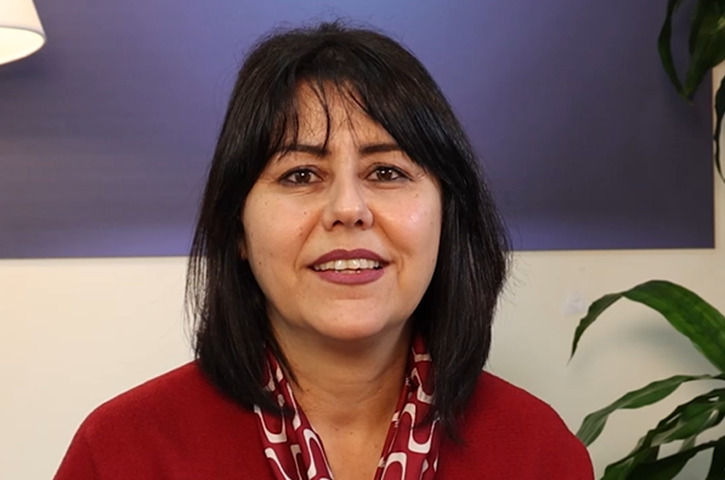The signs are there… How to recognise when you might need to see a therapist
07-12-2022

We all face challenges in life – some are small obstacles that we get over quickly, others are not so small and hold us back for a while, in a stalemate position. Talking to someone has been proven to help, and that is what therapy is - it offers you someone who listens objectively and tries to help.
But instead of talking with a friend who’s outlook and perspective may be biased or who is too emotionally involved, a therapist is there to listen unconditionally and then arm you with the tools to face those challenges head-on. These tools are a form of empowerment, because they will help you combat other similar situations that may arise in the future.
There has been a long-held stigma relating to mental health, as well as a lack of awareness and understanding about the benefits of therapy. When coupled together, they may make it difficult for people to seek professional help for their challenges.
Therapy is for people who want to improve their mental health in different ways. From navigating the path that you want to take for your future, to dealing with depression or grief, to just having an objective figure to check-in with, therapy is beneficial for so many reasons. What’s more, online therapy takes it one step further in that you no longer have to deal with the stress of cultural taboos – it’s completely anonymous.
So… Is it time for you to see a therapist? Read on to discover if the warning signs are evident in your life.
How to identify when it’s time to see a therapist
There are numerous reasons as to why someone might see a therapist. Here are some of the most common warning signs that the time has come for you to do the same.
Feelings of hopelessness most commonly arise after a painful experience or trauma. Hopelessness is a symptom of depression and can make you feel unmotivated, worried, anxious and unhappy. For many people, these feelings are too difficult to overcome on their own.
Speaking with a certified, trained therapist will help you to identify the negative thought patterns associated with hopelessness and address these feelings by improving self-esteem.
Everybody feels worried and stresses about the future to some degree. It is the intensity and persistence of these symptoms that may suggest a more serious form of anxiety that requires professional help.
Therapy can help you to:
Once you experience a loss of interest in activities you once enjoyed, it is a sure sign that you should consider talking with a therapist. Losing interest in activities, or feeling flat and unmotivated, are characteristic symptoms of depression.
Therapy can help target these symptoms and help you to reconnect with your values, beliefs, and goals, through which, you will be inspired to enjoy, again, the things you once enjoyed before.
Major life transitions can be a stressful time for many people. Whether you are entering a new phase in your life and you are considering all the uncertainties of the future, or closing a chapter on the past and feeling sadness and loss, the pain, anxiety, and emotional stress can take a heavy toll on your mental health. Examples of these life transitions include marriage, divorce or separation, moving away from home, changing your career path, or the loss of a loved one.
Therapy can help you deal with stressful life transitions by teaching you how to:
Grief over the loss of a loved one, or experiencing a traumatic event, can be the most difficult experiences to overcome on your own. Not everyone needs professional help to get through but, if left unchecked, symptoms of grief or trauma may transform into intense overwhelm, shock, or depression.
Therapy is a beneficial way to help you process the pain and loneliness of loss by offering a safe and compassionate space in which to share your emotional burden. A therapist can also help you to overcome a traumatic event by teaching you coping mechanisms.
The intimacy of relationships is often intertwined with our mental health. On the one hand, conflicts, arguments, or breakups can cause much stress in life. On the other hand, if your mental health is not being looked after, that can cause a strain on your relationships.
If you notice that it is difficult to maintain healthy boundaries in a relationship, or feel that there are not many people you can be yourself with, it might be a sign to start therapy. Therapy can be helpful for both couples and individuals to improve communication skills, build trust, foster mutual respect, and relearn the key aspects of sincere interpersonal relationships.
Withdrawing from your friends or social situations and increasingly isolating yourself is a concrete sign that you may need therapy. Social withdrawal may mean that you are dealing with more than just a phase of the blues, and could result in social anxiety, where you go to great lengths to avoid social interactions.
Speaking with a certified therapist can help you overcome self-isolating practices. It can help you to enjoy socializing with your friends again by identifying and addressing the triggers that led you to isolate in the first place.
Benefits of therapy
These are just a few of the signs to be aware of when considering whether or not you need therapy, and recognising them is an essential first step in regaining control of your life.
There is no shame in therapy and the benefits of it can be extremely empowering. It can allow you to work through negative thought patterns and behaviours, stay connected with your friends and family, get your life back on track, and empower you with the tools to face your challenges should you encounter the same, or similar, symptoms again. Most importantly, therapy can help you to understand and get to know yourself better.
Start your online therapy journey
Speaking with a licensed therapist can be extremely helpful and productive, and it is very easy to begin. Get matched with a therapist according to your needs and pave a new road for your future.
Start now
But instead of talking with a friend who’s outlook and perspective may be biased or who is too emotionally involved, a therapist is there to listen unconditionally and then arm you with the tools to face those challenges head-on. These tools are a form of empowerment, because they will help you combat other similar situations that may arise in the future.
There has been a long-held stigma relating to mental health, as well as a lack of awareness and understanding about the benefits of therapy. When coupled together, they may make it difficult for people to seek professional help for their challenges.
Therapy is for people who want to improve their mental health in different ways. From navigating the path that you want to take for your future, to dealing with depression or grief, to just having an objective figure to check-in with, therapy is beneficial for so many reasons. What’s more, online therapy takes it one step further in that you no longer have to deal with the stress of cultural taboos – it’s completely anonymous.
So… Is it time for you to see a therapist? Read on to discover if the warning signs are evident in your life.
How to identify when it’s time to see a therapist
There are numerous reasons as to why someone might see a therapist. Here are some of the most common warning signs that the time has come for you to do the same.
Feelings of hopelessness
Feelings of hopelessness most commonly arise after a painful experience or trauma. Hopelessness is a symptom of depression and can make you feel unmotivated, worried, anxious and unhappy. For many people, these feelings are too difficult to overcome on their own.
Speaking with a certified, trained therapist will help you to identify the negative thought patterns associated with hopelessness and address these feelings by improving self-esteem.
Symptoms of anxiety
Everybody feels worried and stresses about the future to some degree. It is the intensity and persistence of these symptoms that may suggest a more serious form of anxiety that requires professional help.
Therapy can help you to:
- Recognise the triggers that cause anxiety;
- Challenge problematic thoughts or beliefs and replace them with healthier, more constructive ones;
- Learn coping skills to overcome challenging emotions in the future.
No interest in activities you once enjoyed
Once you experience a loss of interest in activities you once enjoyed, it is a sure sign that you should consider talking with a therapist. Losing interest in activities, or feeling flat and unmotivated, are characteristic symptoms of depression.
Therapy can help target these symptoms and help you to reconnect with your values, beliefs, and goals, through which, you will be inspired to enjoy, again, the things you once enjoyed before.
Experiencing a life transition
Major life transitions can be a stressful time for many people. Whether you are entering a new phase in your life and you are considering all the uncertainties of the future, or closing a chapter on the past and feeling sadness and loss, the pain, anxiety, and emotional stress can take a heavy toll on your mental health. Examples of these life transitions include marriage, divorce or separation, moving away from home, changing your career path, or the loss of a loved one.
Therapy can help you deal with stressful life transitions by teaching you how to:
- Prepare for events that may, or may not happen, in the future;
- Set expectations and small, attainable goals;
- Stay connected to a healthy social circle;
- Practice self-compassion.
Grief or trauma
Grief over the loss of a loved one, or experiencing a traumatic event, can be the most difficult experiences to overcome on your own. Not everyone needs professional help to get through but, if left unchecked, symptoms of grief or trauma may transform into intense overwhelm, shock, or depression.
Therapy is a beneficial way to help you process the pain and loneliness of loss by offering a safe and compassionate space in which to share your emotional burden. A therapist can also help you to overcome a traumatic event by teaching you coping mechanisms.
Problems in relationships
The intimacy of relationships is often intertwined with our mental health. On the one hand, conflicts, arguments, or breakups can cause much stress in life. On the other hand, if your mental health is not being looked after, that can cause a strain on your relationships.
If you notice that it is difficult to maintain healthy boundaries in a relationship, or feel that there are not many people you can be yourself with, it might be a sign to start therapy. Therapy can be helpful for both couples and individuals to improve communication skills, build trust, foster mutual respect, and relearn the key aspects of sincere interpersonal relationships.
Avoiding social situations
Withdrawing from your friends or social situations and increasingly isolating yourself is a concrete sign that you may need therapy. Social withdrawal may mean that you are dealing with more than just a phase of the blues, and could result in social anxiety, where you go to great lengths to avoid social interactions.
Speaking with a certified therapist can help you overcome self-isolating practices. It can help you to enjoy socializing with your friends again by identifying and addressing the triggers that led you to isolate in the first place.
Benefits of therapy
These are just a few of the signs to be aware of when considering whether or not you need therapy, and recognising them is an essential first step in regaining control of your life.
There is no shame in therapy and the benefits of it can be extremely empowering. It can allow you to work through negative thought patterns and behaviours, stay connected with your friends and family, get your life back on track, and empower you with the tools to face your challenges should you encounter the same, or similar, symptoms again. Most importantly, therapy can help you to understand and get to know yourself better.
Start your online therapy journey
Speaking with a licensed therapist can be extremely helpful and productive, and it is very easy to begin. Get matched with a therapist according to your needs and pave a new road for your future.
Start now





